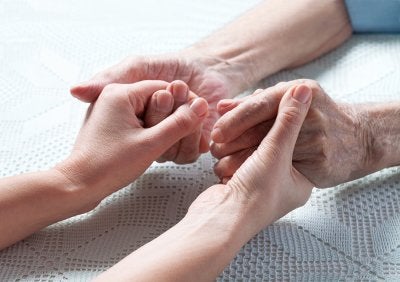-
Planning for Care at the End of Life
No one likes to think about his or her own death or the death of a loved one, but planning for end-of-life care can make a painful situation easier for everyone. Hospice care in Memphis can play an important part in end-of-life care. Watch this video to learn more.
Try starting a conversation about end-of-life care before someone is facing a terminal illness so that you know your loved one preferences. There are many different options, including terminally ill caregiving at home and hospice home care that provides support for both the patient and the family. Deciding about end-of-life care before it is needed helps families focus on the time they have left together when a terminal illness occurs.
-
Steps to Take When a Loved One Dies at Home
Individuals who are in hospice care are often more comfortable living out the rest of their lives at home. The majority of end of life caretaking in Memphis may be handled by hospice professionals and by an in-home caregiver from a private agency. The primary family caregiver, who is usually the spouse or an adult child, will need to have a checklist of steps to take when the individual passes on.

Locate the DNR
It is likely that your loved one would have a “do not resuscitate” (DNR) order if he or she is in hospice care. You will need to know about this as soon as your loved one enters into hospice care. The DNR is a document that must be issued by a physician. It instructs healthcare providers and/or first responders not to initiate resuscitation efforts in the event that the individual displays cardiac or respiratory arrest. Without a DNR, healthcare providers are required to perform cardiopulmonary resuscitation (CPR). This results in a distressing situation for the surviving family members.
Call Hospice and the Caregiver Agency
After a loved one dies at home , there is usually no need to act immediately. You may wish to sit with your loved one in quiet reflection or you may need to go elsewhere in the home to gather yourself. When you’re ready, call the hospice care team and the private caregiver agency to notify them of the death. They will arrive at your home shortly to assist you and make the official pronouncement.
Contact the Funeral Home
If pre-need arrangements have already been made, you can call the funeral home to notify them. Otherwise, select a local funeral home and make arrangements for the collection of the body. Before the funeral home representatives arrive, the hospice nurse and other caregivers will have already taken certain steps to care for the body and disconnect medical equipment, if necessary.
Make Notifications
If you have close family members nearby, you may wish to notify them before you call the funeral home. They may wish to spend some time with the decedent before he or she is removed. Otherwise, you can make notifications as soon as you feel able to do so. You may not need to make every phone call; notify a core group of close family members and ask that they finish the notifications for you.
-
Does Your Family Need Respite Care?
If you’re providing in-home care for a loved one in Memphis, then you already know how challenging it is to get everything done and still be able to provide the companionship your loved one needs. If you aren’t quite ready to switch to full-time assisted living services, then short-term in-home care could be right for your family. Short-term elder care is known as respite care.
Watch this video to find out more about caregiver burnout. The medical school student featured here explains that caregiver burnout may be indicated by physical symptoms such as insomnia, frequent illnesses, and fatigue, as well as mental and emotional signs such as mood swings, irritability, and changes in temperament. Since being a caregiver leaves little time to care for your own needs, it’s advisable to seek respite care services before you become in dire need of them.
-
A Look at the Mission of Caring Companions
For more than 20 years, Caring Companions has provided compassionate in-home care for families in Memphis. As a caregiver agency that is rooted in faith, our associates are particularly dedicated to serving others; in fact, we view it as our ministry. Our assisted living services encompass all non-medical needs that our clients may need, including personal hygiene care, ambulation, transportation assistance, medication reminders, incidental housekeeping, and specialized dementia care.
Our suite of elder care services only tell part of the story of who we are. The professionals of Caring Companions have a keen understanding of the unexpected turns that life can take. We’ll be there for your family during the most difficult of times—from the diagnosis of serious illnesses to end of life care when the time has come. It’s our mission to help individuals live independently, with grace and dignity, but it’s also our mission to guide whole families through transitional times.

-
Identifying Common Post-Operative Challenges
Senior assisted living services are often utilized when a loved one is in declining health, but it’s also a good idea to hire an in-home caregiver in Memphis when a loved one is discharged from the hospital after surgery. This is known as transitional care because the patient is transitioning from hospital care to assisted living care at home. An assisted living provider can help recovering patients with a wide range of post-operative challenges.

Medication Management
After an operation, there may be a number of different medications that a patient might need to take. Typically, post-operative patients take antibiotics and narcotic pain relievers, followed by over-the-counter pain relievers as healing progresses. Some patients might also need to take blood-thinners to reduce the risk of blood clots in addition to their normal medications. It can be a challenge to juggle all of these pills. An in-home caregiver providing transitional care can help patients manage medications by providing medication reminders. This prevents the possibility that a patient might accidentally skip a dose or take an extra dose.
Personal Hygiene
Some surgeries are minimally invasive and may only impose minor limitations on movement. Other operations require a large incision, which can significantly interfere with a patient’s mobility and self-care abilities, particularly if the patient wasn’t in good overall health before the surgery. A transitional care provider may be essential for the patient’s hygiene. Caregivers can assist patients with bathing, dressing, grooming, and toileting, among other routine tasks.
Household Upkeep
For a healthy recovery from surgery, it’s essential to follow the doctor’s post-operative instructions carefully. Usually, these instructions will include limitations on heavy lifting, bending over, and any other strenuous activities. Housekeeping tasks will certainly be out of the question for recovering post-op patients. This is another major benefit of working with a transitional in-home care provider after surgery; all of these tasks can be taken care of by a professional.
Meal Preparation
Balanced nutrition plays a crucial role in the healing process, yet it’s usually difficult for post-operative patients to prepare their own meals. Rather than relying on unhealthy take-out food or premade, frozen meals, patients can enjoy nutritious and delicious homemade meals prepared by an in-home caregiver.
-
The Nutrition-Related Problems of Dementia Patients
Good nutrition is important for seniors, but those with dementia often experience challenges getting the right nutrients. This may be because seniors living with dementia may have a reduced appetite, be too distracted at mealtimes, or have problems feeding themselves. If you’re concerned about your loved one’s health, consider talking to a home health aide near Memphis. Specialized elder care services are available for individuals with dementia, including assistance with meal preparation and feeding.

Poor Appetite
Elder care providers can assist your loved one with a decline in appetite. Among seniors with dementia, poor appetite is often attributable to poorly fitted dentures, changes in medications, and the lack of sufficient exercise. Some people may not want to eat because they no longer recognize the food or because they no longer have a strong sense of taste and smell. It may be helpful to serve five or six smaller meals instead of three main meals. Preparing the individual’s favorite foods and encouraging him or her to move a little more may both help improve his or her appetite.
Mealtime Distractions
Individuals with dementia have trouble with stimulating environments. They may have trouble eating if there are too many distractions present, which can inhibit their ability to get all the nutrients they need . Elder care providers often prefer to keep the television and radio turned off during mealtimes. It can also be helpful to eliminate clutter to encourage a calm environment. For example, it’s best to remove the vase of flowers or bowl of fruit from the table during mealtimes. Only set down the plate of food, a napkin, and needed utensils.
Feeding Problems
It may take an hour or longer for an individual with dementia to consume a meal. Fortunately, dementia care providers have plenty of time to sit with the individual and keep him or her company while eating. It’s generally preferable to allow the individual to retain as much independence as possible while eating, even if self-feeding becomes messy. The caregiver may serve bite-sized finger foods to encourage the individual’s self-feeding abilities. During the mid-to late stages of dementia, it can be helpful to prepare foods in a way that minimizes difficulty chewing and swallowing, such as by grinding up foods or serving soft foods.
-
How to Plan for a Hospital Discharge
If you have a loved one in the hospital, it’s likely that your focus is on his or her immediate well-being. But it is important to take a few minutes to consider his or her post-discharge needs, particularly if your loved one is an older adult who may require assisted living services. First, meet with the hospital care coordinator to discuss which challenges your loved one will face when he or she returns home. Then, contact a caregiver agency in Memphis and schedule an elder care consultation.
When you meet with the representative at the home health agency, bring along a list of your loved one’s anticipated post-discharge challenges. These will likely include mobility limitations and self-care impairments. Develop an elder care plan for your loved one that addresses all of his or her needs. Discharge planning will help your loved one focus on his or her recovery and maintain a high standard of living despite his or her limitations.

-
Anticipatory Grief: Understanding Your Emotional Needs
The families of loved ones who are terminally ill already know all too well that the grieving process begins before the death occurs. But anticipatory grief is not as widely acknowledged and so families may not take the time that they need to acknowledge their own emotional needs. It’s important for families to reach out for help when needed. A caregiver agency near Memphis can provide in-home hospice care to help families focus on their emotional and spiritual needs.

Understanding Anticipatory Grief
Anticipatory grief shares many of the same characteristics as grief after a loved one has passed. Some individuals describe feeling as though they’re losing their minds or can no longer think clearly. Anticipatory grief encompasses anger, sadness, loneliness, depression, and guilt. It can also bring feelings of fear, fatigue, and emotional numbness. It’s important to understand that there is no “normal” way to grieve for someone who hasn’t yet passed on; everyone will have a different experience. It’s not uncommon for individuals to imagine what life will be like after the death; some may go as far as to imagine what they will do with the person’s possessions or with the family home. These thoughts should not be interpreted as indicating callousness. They are simply the mind’s way of trying to cope with an unimaginable situation.
Identifying End of Life Services
During such a difficult time, your family needs elder care services more than ever. At this stage, these services are known as end of life care or hospice care. While many individuals feel that they ought to provide all of the care themselves, this is often not practical and it can detract from the process of saying goodbye to the dying family member. Instead, hire a hospice caregiver to provide services such as personal hygiene tasks and light housekeeping. You owe it to yourself to give yourself a break.
Saying Goodbye Without Regrets
Ask yourself if you will have any regrets when your loved one is gone. Many people regret never truly saying goodbye or making amends for past conflicts. When the dying person is a parent, many adult children regret never reassuring him or her that they will take care of the surviving spouse. Spend time with your loved one in quiet reflection, share treasured memories, and say goodbye without regrets.
-
A Look at Our Approach
The team at Caring Companions has been caring for elders in Memphis and the surrounding areas for more than 14 years. Our mission is to improve quality of life for the families that we work with. The work that we do is much more than a job; our caregivers view elder care as a ministry of service to others.
When you watch this video, you’ll hear from Renee Smith, the owner of Caring Companions, who explains our respite care services available to family caregivers. You’ll also hear from one of our in-home caregivers and from a family who is receiving services. Our in-home care services provide so much more than just practical assistance; they also offer loving kindness and companionship.
-
The Importance of Hospice Care for Patients and Their Families
When diagnosed with a limited life expectancy, patients, as well as their families, are left with decisions to make about end of life services. If you’re considering hospice care near Memphis , it’s vital to understand how this service can help patients and their families.

For Specialized Care
Hospice care providers are uniquely equipped with the knowledge and skills needed for helping terminally-ill people feel more comfortable and at ease during their final days. The support that these providers can lend can make the end of life process easier on both the patient and his family. When you and your loved one choose to benefit from hospice care, this prevents complications associated with overtreatment at this stage in the patient’s life. Additionally, hospice providers can help patients and their families cope with the final stages of life.
For Personal Assistance
When a patient is considering hospice care, they may be worried about the help they will require in their final days. Opting for specialized end of life care can help patients and families enjoy more time together. Caring for a sick individual can be time-consuming and exhausting, as well as stressful. Hospice care providers can help by providing assistance with light housekeeping, laundry, food preparation, and personal hygiene. These services allow family members to take a break from their caretaker duties and spend more quality time with their loved ones during this emotional period.
For Quality Time
Making patients as comfortable as possible during the final stages of life can help them feel less fearful about the dying process and ease some of their stressful emotions. Hospice care providers are skilled at helping patients who are terminally ill, and can be prepared for situations that family members may not be prepared to handle. Hospice care enables families to enjoy more of their remaining time together by experiencing less stress and worry. When family members feel confident that their loved one received quality care in his last days, the grieving process can be less painful and confusing, making the transition easier for all involved.
